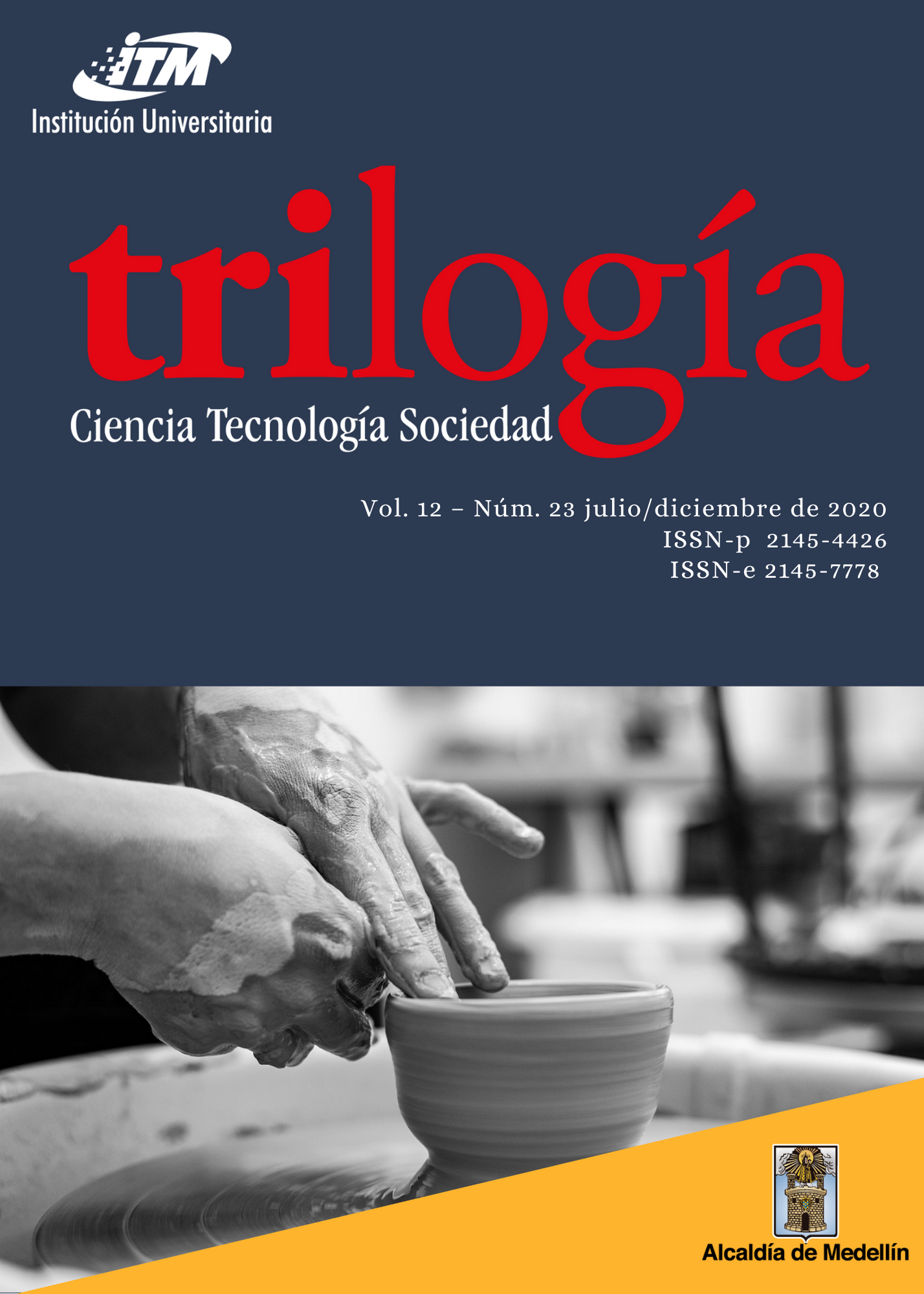Knowledge construction by Psychology students using a synchronous diagrammatic representation tool
Abstract
This research describes the process of collaborative knowledge construction by virtual students of Psychology, by means of a synchronous diagrammatic representation tool. In this mixed study, students made an argument to diagrammatically represent a solution. Students gathered in groups. The analysis consisted in identifying the phases for the construction of knowledge, following these steps: a) organization based on the understanding of the case and agreements to participate, b) exchange of information and argumentation, c) elaboration of constructs and approval of meanings, and d) diagramming the solution of the case. The results show the convenience of a collaborative synchronic tool, because it offers students real-time interaction through argumentation, considering the implications of management in a virtual environment, as well as the formative intent and feedback given by the tutor. The results also show that students are interested in organizing activities, agreeing and abiding by established rules, exchanging information and elaborating meanings to produce knowledge through diagrams from the argumentation. It can be concluded that students were able to establish patterns of interaction derived from the level of involvement and the depth of dialogue during the assignment. Finally, proposals are made for teacher intervention and improvement of collaborative processes.
References
Alcalde, I. (2015). El Trabajo Colaborativo en entornos virtuales. http://www.ignasialcalde.es/el-trabajo-colaborativo-en-entornos-virtuales/
Artola, V.; Sanz, C. V.; Moralejo, L.; Mabel, P. M.; Baldassarri, S. S. (2015). Authoring Tool for Creating Tangible Interaction-Based Educational Activities. Journal of Computer Science and Technology, v. 15, n. 2, 114-121. http://sedici.unlp.edu.ar/handle/10915/50185
Baker, M. (2003). Computer-mediated Argumentative interactions for the co-elaboration of scientific notions. En J. Andriessen; M. J. Baker; D. Suthers (editores), Arguing to Learn: Confronting Cognitions in Computer-Supported Collaborative Learning environments (pp. 47-78). Springer.
Blanco, I. J.; Pérez, R.; Arjona, E.; Cordón, O. (2018). Aspectos organizativos y estructurales de una iniciativa MOOC institucional: el caso de la UGR. International Journal of Information Systems and Software Engineering for big Companies, v. 5, n. 1, 101-110. http://uajournals.com/ojs/index.php/ijisebc/article/view/346/265
Boero, P. (1999). Argumentación y demostración: una relación compleja, productiva, e inevitable en las matemáticas y en la educación matemática. http://www.lettredelapreuve.org/OldPreuve/Newsletter/990708Theme/990708ThemeES.html
Boero, P.; Douek, N.; Morselli, F.; Pedemonte, B. (2010). Argumentation and proof: A Contribution to Theoretical Perspectives and their Classroom Implementation. En M. F. F. Pinto; T. F. Kawasaki (editores), Proceedings of the 34th Conference of the International Group for the Psychology in Mathematics Education (PME) (pp. 1-30). http://www.seminariodidama.unito.it/2011/app/boero34.pdf
Cardeño Espinosa, J.; Muñoz Marín, L. G.; Ortiz Alzate, H. D.; Alzate Osorno, N. C. (2017). La incidencia de los Objetos de Aprendizaje interactivos en el aprendizaje de las matemáticas básicas en Colombia. Trilogía Ciencia Tecnología Sociedad, v. 9, n. 16, 63-84. https://doi.org/10.22430/21457778.182
Carmona Suárez, E. J., Rodríguez Salinas, E. (2017). Buenas prácticas en la educación superior virtual a partir de especificaciones de estándares e-Learning. Sophia, v. 13, n. 1, 13-26. https://doi.org/10.18634/sophiaj.13v.1i.345
Carrasco, P.; Carrillo, M. J.; Bazley, K.; Vergara, A.; Contreras, A. (2017). Foros virtuales y construcción de conocimiento en profesionales de la salud. Enfermería Universitaria, v. 14, n. 3,184-190. https://doi.org/10.1016/j.reu.2017.06.002
Cataldi, Z.; Lage, F. J. (2009). El trabajo grupal con TIC y su aporte al desarrollo de competencias. En XV Congreso Argentino de Ciencias de la Computación. Universidad Nacional de Jujuy, Argentina. http://sedici.unlp.edu.ar/handle/10915/20948
Chaljub Hasbún, J. M. (2014). Trabajo colaborativo como estrategia de enseñanza en la universidad. Cuaderno de Pedagogía Universitaria, v. 11, n. 22, 64-71. https://doi.org/10.29197/cpu.v11i22.213
Coll, C.; De Gispert, I.; Rochera, M. J. (2010). Tópicos y cadenas: una aproximación al análisis de la construcción conjunta de significados en foros de conversación en línea. Culture and Education. Cultura y Educación, v. 22, n. 4, 439-454. https://doi.org/10.1174/113564010793351885
De Freitas, S.; Neumann, T. (2009). Pedagogic strategies supporting the use of Synchronous Audiographic Conferencing: A review of the literature. British Journal of Educational Technology, v. 40, n. 6, 980-998, https://doi.org/10.1111/j.1467-8535.2008.00887.x
Dreizzen, E.; Zangara, M. A.; Spinelli, O. M. (2014). Formación de docentes de la carrera de Medicina en el diseño de contenidos educativos mediante Moodle. Revista Iberoamericana de Tecnología en Educación y Educación en Tecnología, n. 3, 72-79. https://teyet-revista.info.unlp.edu.ar/TEyET/article/view/315
Falloon, G. (2011). Making the Connection: Moore's Theory of Transactional Distance and Its Relevance to the Use of a Virtual Classroom in Postgraduate Online Teacher Education. Journal of Research on Technology in Education, v. 43, n. 3, 187-209. https://doi.org/10.1080/15391523.2011.10782569
Harasim, L.; Hiltz, S. R.; Turoff, M.; Tele, L. (2000). Redes de aprendizaje. Guía para la enseñanza y el aprendizaje en red. Gedisa.
Hernández Sampieri, R.; Fernández Collado, C.; Baptista Lucio, P. (2014). Metodología de la Investigación (6.a ed.). McGraw-Hill.
Hernández Sellés, N. (2015). El trabajo colaborativo en entornos virtuales en educación superior (Tesis de doctorado). http://hdl.handle.net/2183/14726
Infante-Moro, A.; Infante-Moro, J. C.; Torres-Díaz, J. C.; Martínez-López, F. J. (2017). Los MOOC como sistema de aprendizaje en la Universidad de Huelva (UHU). IJERI: International Journal of Educational Research and Innovation, n. 7, 13-24. https://www.upo.es/revistas/index.php/IJERI/article/view/2296
Kreijns, K.; Kirschner, P. A.; Jochems, W. (2003). Identifying the Pitfalls for Social Interaction in Computer-Supported Collaborative Learning Environments: A Review of Research. Computers in Human Behaviour, 19, 335-353. https://doi.org/10.1016/S0747-5632(02)00057-2
Mariotti, M. A.; Bartolini-Bussi, M. G.; Boero, P., Ferri, F.; Garuti, R. (1997). Approaching geometry theorems in contexts: From history and epistemology to cogniton. En E. Pehkonen (editor), Proceedings of the 21st Conference of the International Group for the Psychology of Mathematics Education (pp. 180-195). https://files.eric.ed.gov/fulltext/ED416082.pdf
Martínez Villalobos, G.; Arciniegas, A. M.; Lugo González, C. A. (2016). Formación docente en TIC con el Centro de Innovación Educativa CIER-SUR. Trilogía Ciencia Tecnología Sociedad, v. 8, n. 14, 65-80. https://doi.org/10.22430/21457778.417
Mercado Borja, W. E.; Guarnieri, G.; Rodríguez, G. L. (2019). Análisis y evaluación de procesos de interactividad en entornos virtuales de aprendizaje. Trilogía Ciencia Tecnología Sociedad, v. 11, n. 20, 63-99. https://doi.org/10.22430/21457778.1213
Monguillot Hernando, M.; Guitert Catasús, M.; González Arévalo, C. (2013). El trabajo colaborativo virtual: herramienta de formación del profesorado de educación física. RETOS. Nuevas Tendencias en Educación Física, Deporte y Recreación, n. 24, 24-27. https://www.redalyc.org/articulo.oa?id=3457/345732290005
Morales Salas, R. E.; Infante-Moro, J. C.; Gallardo-Pérez, J. (2019). La mediación e interacción en un AVA para la gestión eficaz en el aprendizaje virtual. Campus Virtuales, v. 8, n. 1, 49-61. http://www.uajournals.com/ojs/index.php/campusvirtuales/article/view/425
Muñoz-Osuna, F. O.; Arvayo-Mata, K. L.; Villegas-Osuna, C. A.; González-Gutiérrez, F. H.; Sosa-Pérez, O. A. (2014). El método colaborativo como una alternativa en el trabajo experimental de Química Orgánica. Educación Química, v. 25, n. 4, 464-469. https://doi.org/10.1016/S0187-893X(14)70068-0
Onrubia Goñi, J.; Naranjo Llanos, M.; Segués, M.T. (2009). Debate y construcción de conocimiento en foros virtuales: la importancia de los motivos de los participantes en la actividad. Culture and Education. Cultura y Educación, v. 21, n. 3, 275-289. https://doi.org/10.1174/113564009789052325
Ortiz, A. (2010). La comunicación virtual: del gesto a las redes. Editorial Voluntad.
Osborne, J.; Erduran, S.; Simon, S. (2004). Enhancing the quality of argumentation in school science. Journal of Research in Science Teaching, Hoboken, v. 41, n. 10, 994-1020. https://doi.org/10.1002/tea.20035
Parra, F.; Kelia. N. (2014). El docente y el uso de la mediación en los procesos de enseñanza y aprendizaje. Revista de Investigación, v. 38, n. 83, 155-180. https://www.redalyc.org/pdf/3761/376140398009.pdf
Revelo-Sánchez, O.; Collazos-Ordoñez, A.; Jiménez-Toledo, A. (2018). El trabajo colaborativo como estrategia didáctica para la enseñanza/aprendizaje de la programación: una revisión sistemática de literatura. TecnoLógicas, v. 21, n. 41, 115-134. https://doi.org/10.22430/22565337.731
Rodríguez Zamora, R.; Espinoza Núñez, L. A. (2017). Trabajo colaborativo y estrategias de aprendizaje en entornos virtuales en jóvenes universitarios. RIDE Revista Iberoamericana para la Investigación y el Desarrollo Educativo, v. 7, n. 14, 86-109. https://doi.org/10.23913/ride.v7i14.274
Sancho Saiz, J.; Barandiarán Landín, M. C.; Apodaca Urquijo, P. M.; Lobato Fraile, C. S.; San José Álvarez, M. J.; Zubimendi Herranz, J. L. (2010). La formación de trabajo en equipo del alumnado universitario con el aprendizaje cooperativo. https://www.usfx.bo/nueva/vicerrectorado/citas/TECNOLOGICAS_20/Ingenieria_Industrial/J%20Sancho.pdf
Sanz, C. V.; Zangara, M. A. (2012). El desarrollo de los foros en el marco de las e-actividades en una propuesta de educación mediada. TE & ET, n. 7, 29-35. http://sedici.unlp.edu.ar/handle/10915/18285
Schullo, S. J. (2005). An Analysis of Pedagogical Strategies: Using Synchronous Web-Based Course Systems in the Online Classroom (Tesis de doctorado). https://scholarcommons.usf.edu/etd/856/
Torres-Díaz, J. C.; Infante Moro, A.; Valdiviezo Díaz, P. (2014). Los MOOC y la masificación personalizada. Profesorado: Revista de Currículum y formación del profesorado, v. 18, n. 1. http://www.ugr.es/~recfpro/rev181ART4.pdf
Toulmin, S. (1958). The uses of Argument. Cambridge University Press.
Downloads
Copyright (c) 2020 Instituto Tecnológico Metropolitano

This work is licensed under a Creative Commons Attribution-NonCommercial-ShareAlike 4.0 International License.
Altmetric










